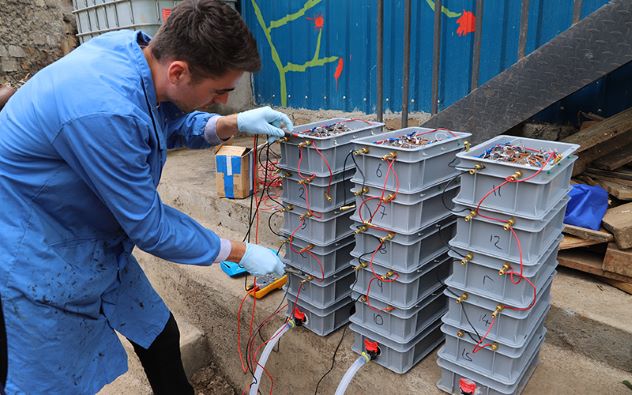

Now Urine can be used to power your electronics
In the foul-smelling areas that we encounter in our day to day lives, often lie open sewers or sewage treatment plants. While we loathe these structures, the growing density of our cities and the general urbanization rate have made them indispensable for our water and some of our electricity needs.
Robial, a company from UK is offering one such option that could help solve this stench ridden problem. The social enterprise at the University of West England (UWE), is attempting to commercialise ‘Pee Power’, which uses microbial fuel cells that feed off organic carbon found in urine and wastewater to produce electricity.
Robial which was founded only in November 2018 wants to commercialize the concept that has been in the works for a long time and could be revolutionary, having advantages in both renewable energy generation and the recycling of wastewater.
Funded by the Bill and Melinda Gates Foundation, the UK Engineering and Physical Sciences Research Council (EPSRC) and the European Commission, Professor Ioannis Ieropoulos, director of the Bristol BioEnergy Centre at UWE and creator of the Pee Power technology, developed microbial fuel cells as part of his PhD project 17 years ago. After years of perfecting the technique, now the technology is being readied for commercialization and has been trialed successfully in African refugee camps, as well as at Glastonbury Festival in the UK. It has been used to provide lighting for toilet blocks at schools in Uganda and Kenya.


[related_post]
What are Microbial Fuel Cells?
Urine and wastewater can be used as energy as they contain organic carbon, which the microbes in the microbial fuel cells effectively use as food to survive.
A microbial fuel cell is formed of two half-cells, each with electrodes inside. One of the two half-cells is inoculated with live bacteria collected from the natural environment. The bacteria grow and maintain themselves on the electrode, using it as an anaerobic respirator.
“Just like any other form of respiration, they will be taking in carbon energy and other compounds and they will be respiring and excreting metabolites,” explains Ieropoulos. “In that half-cell, which is called the anode of a microbial fuel cell, the electrode becomes the recipient of those electroactive metabolites. The microbes will be excreting and respiring directly onto the electrode’s surface.”
Like all organisms, the microbes need fuel or feedstock. Ieropoulos’ team at UWE experimented with different types of feedstock, including municipal and industrial wastewater, dead insects, rotten fruit, prawns shells, and – finally – urine.
To put it simply, the microbial fuel cells employ living microbes, which feed on the organic carbon found in urine for their own growth and maintenance. The cell system extracts that biochemical energy excreted while the microbes are living, converting it directly into electricity.
“It is important to mention that the microbial fuel cell produces DC power, which is the equivalent of batteries or solar panels and so you can imagine what it could be directly plugged into,” says Ieropoulos. “Instead of using batteries or solar panels if the sun doesn’t shine in a particular part of the world, or if you are underground, for example, you could be using this technology.”
Currently, a microbial fuel cell that uses 10ml of urine or wastewater can generate 1-2 milliwatts (mW) of power, and so the potential for using trillions of liters of wastewater is clear. The enterprise says that after the successful trial in Uganda and Kenya, other field trials are in the pipeline and currently under consideration are sites in India, Nepal and South Africa.
While Robial is still a new enterprise, if Pee Power’s commercialisation attempts are successful, we could all soon be generating some of our own local power needs, simply by going to the bathroom.
Houston headquartered Syzygy Plasmonics has announced the beginning of Front-End Engineering and Design (FEED) with…
State owned THDC India Limited (THDCIL) has announced the successful commencement of COD process of…
The Uttar Pradesh government is preparing to launch the Uttar Pradesh Sustainable Aviation Fuel (SAF)…
India’s cooperative sugar industry is urging the government to revise ethanol procurement prices and extend…
The Indian Biogas Association (IBA) has announced a key step taken to boost biofuels sector…
In a key development that would bolster the development of green hydrogen in the North…